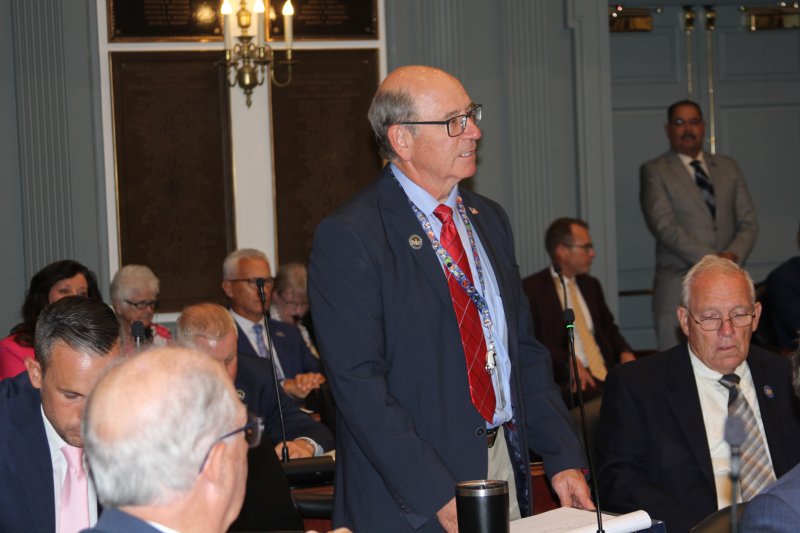Five bills addressing the recent property tax reassessments were signed into law following a marathon special session Aug. 12 in the legislature.
The bulk of the session, called by Democrat leadership that ended about 10 p.m., was dominated by discussion over procedure to suspend rules in order to pass the legislation. Normally, bills are vetted through a committee process with plenty of public and stakeholder input before more discussion on the House and Senate floors leading up to a vote.
House Minority Whip Rep. Jeff Spiegelman, R-Smyrna, pulled out the House rules book to prove that debate is allowed regarding whether to suspend rules on a bill.
“The stakeholders brought together were the only ones allowed by those in majority leadership rather than a committee system that would’ve been open to anyone,” he said. “This lack of public input silences the public, silences minority public opinion … This suspension of rules is a slap in the face of the process and the people who will be affected by this.”
Spiegelman reiterated concerns raised by Republican leadership earlier in the day that suspending rules was not necessary, and the bills should have gone through a public committee process so everyone could provide input.
The top House Democrat, Speaker of the House Rep. Melissa Minor Brown, D-New Castle, defended the decision to hold a special session.
“This is an unprecedented time and with it comes unprecedented measures,” she said.
Democrats prevailed in suspending the rules for all bills passed, despite objections by Republicans. But a couple of Democrats said they feel they have no voice in the Democratic caucus.
“You may feel disenfranchised as part of the minority party. I can tell you I agree with that feeling,” said Rep. Madinah Wilson-Anton, D-Ogletown, speaking directly to the Republican side of the room.
Wilson-Anton said deliberation is an important part of the process, but it must be noted who is included and who is not.
“To submit to leadership just because they’re leadership I think is undemocratic, and I think it’s dangerous behavior,” she said.
Again, speaking to Republicans across the aisle, she said cutting the minority party out of conversations on legislation is detrimental to all Delawareans.
Middletown Democrat Rep. Sherae’a Moore said she also feels like she has been cut out of discussions. “Personality is a big thing,” she said, referring to caucus interactions.
Bills that were passed by the House and Senate, and signed into law by Gov. Matt Meyer are:
- House Bill 241 authorizing counties to offer payment plans if a tax bill increases by $300 or more from the previous year, and suspending late penalties from anyone under a payment plan. Late penalties would be 1%
- HB 242 only affects New Castle County, relating to tax rates
- Senate Bill 203 codifies the authority of counties to set different property tax rates for residential and nonresidential properties
- SB 204 does the same as SB 203, but for municipalities.
Senate Concurrent Resolution 122 also passed, ordering a review of the reassessment process to improve future assessments. The resolution does not need governor approval.
Meyer was called as a witness on the House floor by Rep. Michael Smith, R-Newark, to answer reassessment questions since Meyer was New Castle County executive involved in the process before he was elected governor. Neither Meyer nor anyone from his staff attended the session. Meyer also did not respond to questions on whether he would sign an executive order pertaining to property tax assessments, or ask the Chancery Court judge who originally required the reassessments to revise his order.
Rep. Rich Collins, R-Millsboro, voted no on all special session legislation, warning that the days of Delaware being a low-tax state are out the window.
“I just want to make clear to everybody that if you live a normal life span … you’re going to see 20 10% property tax rate increases in your lifetime in addition to all the other types of ways taxes could be raised,” he said.
Rep. Jeff Hilovsky, R-Long Neck, said the public has the right to know how school districts are spending their money for those that opted to take a 10% budget increase allowed under the current reassessment rules.
“I’m shocked that we can’t understand and appreciate how important this is, and how potentially damaging to the taxpayer the ability to increase revenue 10% without exact, almost to the penny, delineation of how they're going to spend the money,” he said.
Hilovsky also shared some examples of tax increases from last year for several Sussex County businesses. Based on records obtained from Sussex County, he said Bayside Pot-Nets is increasing from $46,958 to $177,553; Rehoboth Bay Mobile Home Park increased from $24,676 to $85,343; Seaford Shopping Center is increasing from $77,964 to $124,210; and Bayhealth is increasing from about $138,000 to $173,000.
“As a business person and a property owner myself, how is it possible to make investments in properties?” he said. “There has to be some recognition here that this is out of balance.”
Cape Region Democrats Sen. Russ Huxtable, D-Lewes, and Rep. Claire Snyder-Hall, D-Rehoboth Beach, voted in favor of all the bills. Newly elected Rep. Alonna Berry, D-Milton, voted yes on all bills except for SB 204, which recorded not voting.
Melissa Steele is a staff writer covering the state Legislature, government and police. Her newspaper career spans more than 30 years and includes working for the Delaware State News, Burlington County Times, The News Journal, Dover Post and Milford Beacon before coming to the Cape Gazette in 2012. Her work has received numerous awards, most notably a Pulitzer Prize-adjudicated investigative piece, and a runner-up for the MDDC James S. Keat Freedom of Information Award.






















































